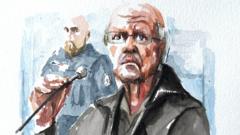Joel Le Scouarnec, a 74-year-old former surgeon, has been sentenced to 20 years in prison for sexually abusing 299 vulnerable patients, primarily children. The victims and advocates express outrage over the leniency of the sentence, calling for legal reforms to ensure more severe punishment for such heinous crimes.
French Surgeon Sentenced for Systematic Child Abuse, Victims Demand Justice Reform

French Surgeon Sentenced for Systematic Child Abuse, Victims Demand Justice Reform
Former surgeon Joel Le Scouarnec receives a 20-year prison sentence for sexually abusing nearly 300 patients, prompting a call for changes in legal standards.
Joel Le Scouarnec, a former surgeon who confessed to sexually abusing 299 patients—most of whom were children—has been sentenced to a maximum of 20 years in prison by the court. The proceedings took place in Brittany, where Le Scouarnec stood emotionless as Judge Aude Burési delivered her verdict. Le Scouarnec, who held a notorious position as France's most prolific paedophile, had previously admitted to the offenses occurring from 1989 to 2014.
A core element of the sentence considered Le Scouarnec's predilection for targeting unwell and vulnerable patients, often under anesthesia or just waking up from operations. With a mandatory minimum term of two-thirds of his sentence, and having already served seven years, he may become eligible for parole by 2030.
Victims reacted with sorrow and anger. Amélie Lévêque, a survivor, expressed her distress at the thought that Le Scouarnec might walk free one day, highlighting the lasting scars carried by the victims. Francesca Satta, an attorney for some of the victims, lamented that the 20-year sentence was disproportionately lenient compared to the trauma inflicted upon so many individuals and urged for a review of the law for harsher penalties.
Le Scouarnec had already been sentenced in 2020 to 15 years for earlier offenses against children, including his own nieces. During his recent trial, he kept detailed diaries that chronicled the assaults, aiding authorities in identifying many of his victims—people who had terrifying gaps in their memories regarding the abuse.
Adding further complexity, Le Scouarnec confessed responsibility for the deaths of two victims who took their own lives following their traumas. In somber acknowledgments, he admitted that he had caused suffering but did not seek leniency from the court.
A collective of Le Scouarnec's victims expressed discontent with the trial's societal coverage, lamenting a perceived lack of substantial response from political entities and the medical community, despite the alarming number of victims. They emphasized the need for a systemic shift to prevent such tragedies from recurring, as various individuals protested outside the courthouse during the sentencing.
Le Scouarnec faced scrutiny not only for his actions but also from his legal representation, which criticized the healthcare system that allowed such abuses to continue unchecked. According to his lawyer Maxime Tessier, the broader medical establishment bore some of the responsibility for failing to intervene despite ongoing rumors of Le Scouarnec's paedophilia, indicating a systemic failure that contributed to the prolonged abuse of his victims.
In contrast, many victims questioned the sincerity of Le Scouarnec's apologies during the trial, emphasizing their doubts about his remorse. Overall, the case has ignited a potent discussion in France around legal reform for child abuse sentencing, underscoring the urgent need for changes in the way such cases are treated, both within the judicial system and in societal awareness.




















